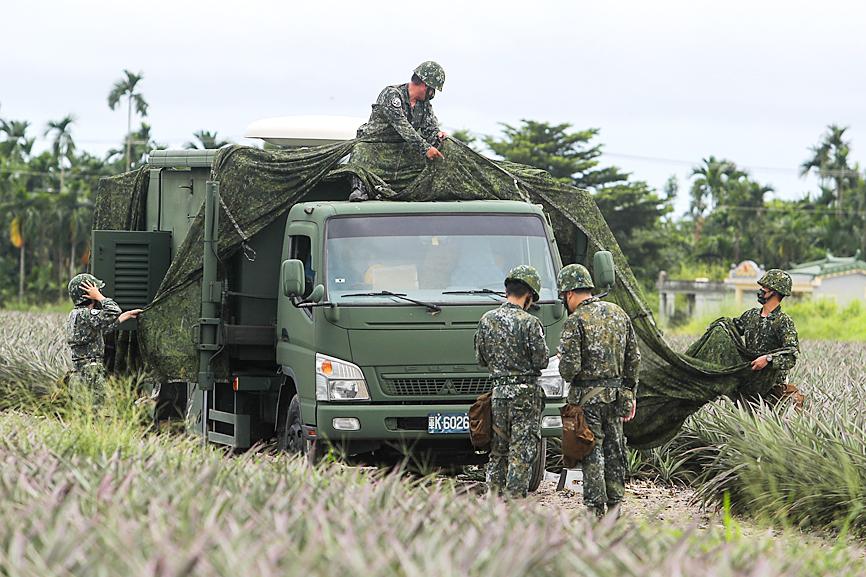Measures to bolster and maintain the willingness to fight is the key to extending the duration of mandatory terms of military service, which would in turn enhance international confidence in Taiwan’s self-defense capabilities, retired air force lieutenant general Chang Yen-ting (張延廷) said.
External threats have prompted Israel, Singapore, South Korea and other nations to mandate military service for one year or more, while Taiwan, despite the threat of the Chinese Communist Party (CCP), has only four months, Chang said.
Pundits have long called for the mandatory service period to be extended, and yet Minister of National Defense Chiu Kuo-cheng (邱國正) on Friday was only willing to say that the issue was being “seriously considered,” Chang said.

Photo: CNA
The issue of extending mandatory service is complicated and faces potential opposition, such as issues of generational injustice and election concerns, Chang said.
Extending the service period would do nothing if people have no will to fight, he said.
Even if the government were to extend the service period, it would not help to improve combat capabilities much, he said, citing a lack of mental preparedness.
Measures to bolster and maintain willingness among Taiwanese to fight would allay international concern about the nation’s self-defense capabilities, he said.
The government should extend the mandatory military service from four months to one year, and mandate that the policy would apply to people born after a certain year, he said.
Chang cited the example when the government said that Taiwanese born after 1994 would only have to serve four months, instead of one year.
A peace-time government must have the moral courage to enact policies to extend the mandatory service period, while the Ministry of National Defense should thoroughly review its training programs, logistics and issue new standards of military education, former National Defense University lecturer Holmes Liao (廖宏祥) said.
Without such changes, a move to extend the mandatory service period would be moot, as people would be wasting two years of their lives in a military without them, Liao said.
Any extension of the period must take into account projections of how many reservist forces Taiwan would have, he said.
An incremental increase in the service period should be implemented so the ministry can keep up with the changes, he said.

The High Prosecutors’ Office yesterday withdrew an appeal against the acquittal of a former bank manager 22 years after his death, marking Taiwan’s first instance of prosecutors rendering posthumous justice to a wrongfully convicted defendant. Chu Ching-en (諸慶恩) — formerly a manager at the Taipei branch of BNP Paribas — was in 1999 accused by Weng Mao-chung (翁茂鍾), then-president of Chia Her Industrial Co, of forging a request for a fixed deposit of US$10 million by I-Hwa Industrial Co, a subsidiary of Chia Her, which was used as collateral. Chu was ruled not guilty in the first trial, but was found guilty

DEADLOCK: As the commission is unable to forum a quorum to review license renewal applications, the channel operators are not at fault and can air past their license date The National Communications Commission (NCC) yesterday said that the Public Television Service (PTS) and 36 other television and radio broadcasters could continue airing, despite the commission’s inability to meet a quorum to review their license renewal applications. The licenses of PTS and the other channels are set to expire between this month and June. The National Communications Commission Organization Act (國家通訊傳播委員會組織法) stipulates that the commission must meet the mandated quorum of four to hold a valid meeting. The seven-member commission currently has only three commissioners. “We have informed the channel operators of the progress we have made in reviewing their license renewal applications, and

Taiwan People’s Party (TPP) Chairman Huang Kuo-chang (黃國昌) yesterday appealed to the authorities to release former Taipei mayor Ko Wen-je (柯文哲) from pretrial detention amid conflicting reports about his health. The TPP at a news conference on Thursday said that Ko should be released to a hospital for treatment, adding that he has blood in his urine and had spells of pain and nausea followed by vomiting over the past three months. Hsieh Yen-yau (謝炎堯), a retired professor of internal medicine and Ko’s former teacher, said that Ko’s symptoms aligned with gallstones, kidney inflammation and potentially dangerous heart conditions. Ko, charged with

Taiwan-based publisher Li Yanhe (李延賀) has been sentenced to three years in prison, fined 50,000 yuan (US$6,890) in personal assets and deprived political rights for one year for “inciting secession” in China, China's Taiwan Affairs Office spokesman Chen Binhua (陳斌華) said today. The Shanghai First Intermediate People’s Court announced the verdict on Feb. 17, Chen said. The trial was conducted lawfully, and in an open and fair manner, he said, adding that the verdict has since come into legal effect. The defendant reportedly admitted guilt and would appeal within the statutory appeal period, he said, adding that the defendant and his family have